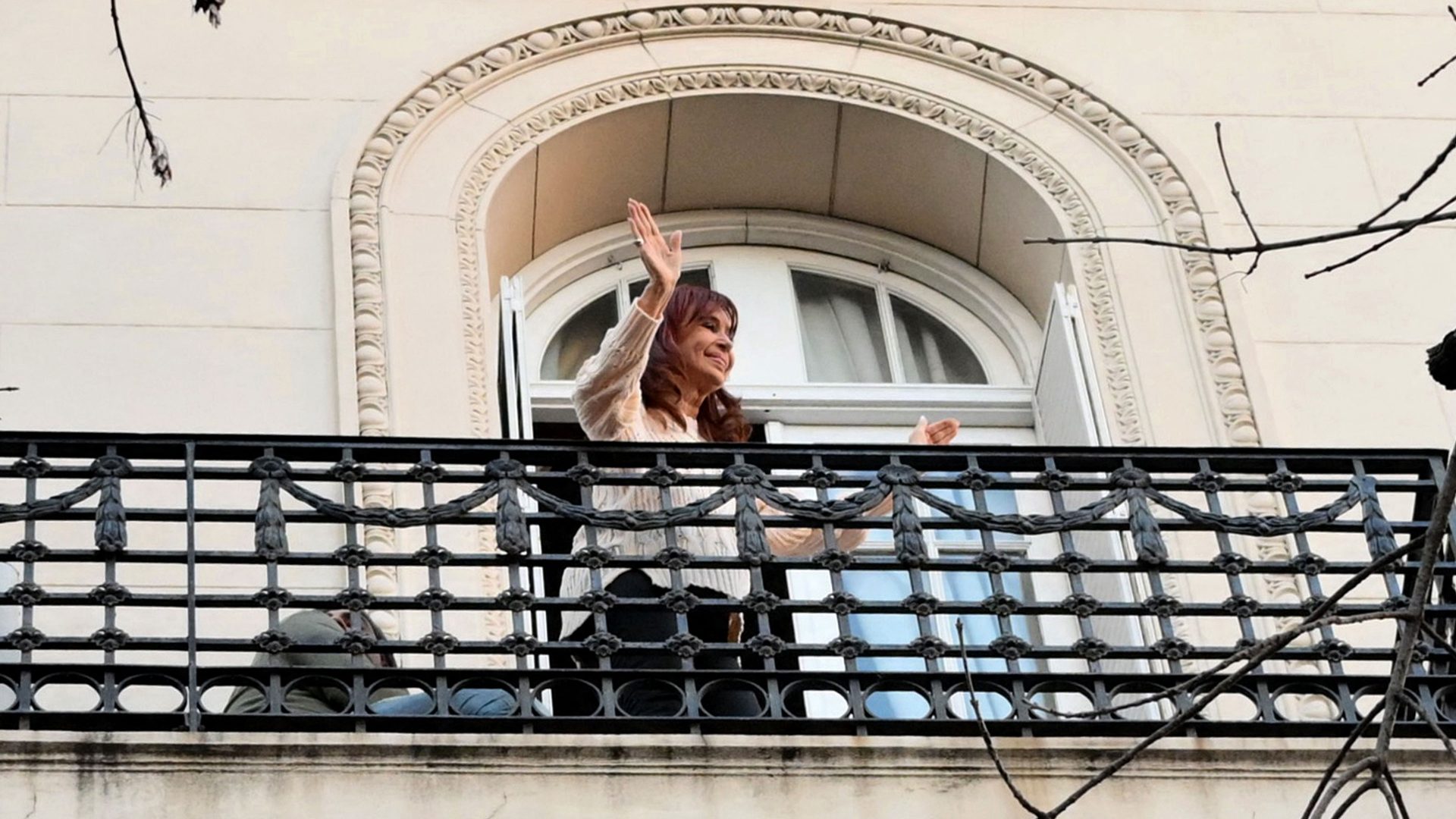In accelerating the charges laid against Cristina Fernández de Kirchner, Javier Milei created a new national myth
One of the most popular attractions in the West End at the moment is the sight of the actress Rachel Zegler performing Don’t Cry for Me Argentina from a theatre balcony for the benefit of people in the street. The gathered public outside, necks craned upwards, represent the descamisados – the “without shirts” working classes who idolised their socialist first lady, Eva Perón.
About 11,000km away, beneath a Buenos Aires balcony, an almost identical scene has been playing out to even greater crowd numbers. But the woman waving dramatically from the balcony to cheering crowds isn’t an actress. She’s the ex-president of the nation, and she’s under house arrest.
Argentines in their thousands have gathered outside the home of former first lady turned two-time socialist president, Cristina Fernández de Kirchner, as she begins a sentence for corruption charges while in office. She was president from 2007-15 and vice-president 2019-23. Now street vendors are gathered below her apartment selling t-shirts emblazoned with her face.
The Evita comparison is uncanny. Both were first ladies, both renowned socialists and both Peronistas. Kirchner became president of the Justicialist Party, the main Peronist party in Argentina, last year. Significantly, this instantly made her a bigger threat to the current radical right wing populist president, Javier Milei.
Both women have also been instrumental in key social reforms that have defined modern Argentina: Evita in helping securing women’s suffrage; Kirchner in legalising same-sex marriage in 2010, the first Latin American country to do so.
Kirchner is deeply divisive. She claims the longstanding charges against her are politically motivated and backed this up by pointing to the timing of her arrest: just as she was planning a political comeback. Kirchner had just announced she was running for a seat in the Buenos Aires provincial legislature in elections this year. Victory, which seemed likely, would’ve granted her immunity from serving her six-year sentence. As she’s 72, she’s allowed to do her time under house arrest. But she’s now barred for life from public office.
The ruling, which found she’d defrauded the state in her two terms as president with corrupt roadway works awarded to friends at inflated prices, comes three years after an assassination attempt on her life.
Emboldened by bromance backslaps from Trump and Musk, Milei is doubling down on those he considers left wing opponents, and Kirchner falls into the category he abhors. From his perspective, she is part of a Peronist political elite which has dominated Argentinian politics and is responsible for the surging inflation caused by their “big government” spending on social and welfare programs. Milei’s chainsaw gimmick represented his intention to chop bloated government programmes. Argentina last year had the world’s highest inflation – 192%.
But Argentinians love a national icon. They make a sport of elevating religious, political or footballing leaders to cult-like figures. There’s an entire religion dedicated to Maradona. Lionel Messi isn’t far off. Fibreglass statues of the late Pope Francis, Evita and Maradona stand in the Buenos Aires neighbourhood of La Boca, which have transformed the working-class suburb into a tourist attraction. Reminders of Evita can be found in every barrio of the city: roads and restaurants are named after her, statues depict her, posters of her are fixed to library and cafe walls. There’s even an entire suburb named in her honour: Ciudad Evita (Evita City), deliberately shaped to resemble her profile from the air.
Even before the drama of her house arrest, and despite her flaws, Kirchner was well on her way to achieving iconic status. In a recent press interview, the then-US ambassador in Buenos Aires, Marc Stanley, said: “like her or not, she’ll go down in history as one of the most influential women in Latin America.”
One of the thousands who recently gathered below her balcony was Bruno Zirpolo Castillo, 31. “I was 16 when she, as the president of the nation, went on national TV and said gay people like me were all worthy of being treated with respect and dignity,” he tells The New World. “It was groundbreaking. I cried. I received more love and empathy from her than from my own parents.”
In accelerating the charges laid against her, Milei was successful in creating a felon. He may also have created a new national myth.
Gary Nunn is a freelance journalist who lived in Buenos Aires from 2023-25
